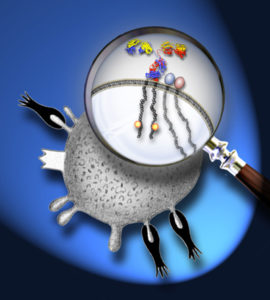The group of PD Dr. Niklas Engels works on signal transduction mechanisms of the B cell antigen receptor involved in the establishment and maintenance of humoral immunity.
Antibodies are key effectors of the immune system. As they are found in large amounts in blood (or serum) they are assigned to the humoral immune system. Antibodies bind to pathogens or components thereof (antigens) thereby labeling them for destruction. They are produced by B lymphocytes, a subpopulation of leukocytes (white blood cells), following recognition of antigen by special antigen receptors (BCRs) expressed on the cell surface. This physical recognition of antigen triggers a complex signal transduction cascade mediated by several intracellular enzymes, which ultimately leads to changes in gene transcription in the nucleus. The function of these signal transducing enzymes is critically regulated by catalytically inert adaptor proteins that control their subcellular localization, access to substrates or their catalytic activity.
The focus of our group is the analysis of the molecular interplay of BCR-regulated signal transducing enzymes and adaptor proteins leading to activation and long-term maintenance of naive and memory B cells. Memory B cells arise upon initial antigen contact and persist for quite long times allowing them to respond quickly with the production of antibodies after antigen recall, which is the functional principle of vaccinations. In the long run our results will provide a better understanding of the immunological memory and give new insights into the incurrence of allergic reactions.

